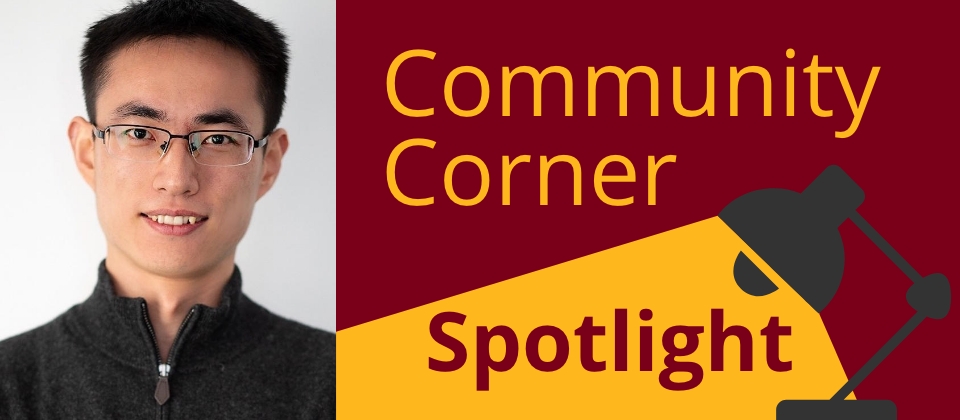Community Corner
Curious about the cutting-edge research happening right here at the University of Minnesota?
Dive into our "Community Corner" series, where we chat with a different faculty member engaged in data science research each month.
Through in-depth interviews, each "Community Corner" feature explores:
- Their current research passions - discover the questions driving their research and the impact it has on the world
- Their unique take on data science - see how diverse perspectives shape the ever-evolving field of data science
- Unexpected research revelations - discover noteworthy and intriguing findings unearthed from the data
- Emerging tools and techniques - learn about innovative tools and libraries utilized by data science researchers
- The future of data science - get a glimpse into the exciting possibilities and potential disruptions that lie ahead in the next five years.

Zhenong Jin
This month's spotlight is on: Zhenong Jin Assistant Professor, Department of Bioproducts and Biosystems Engineering
1. What are your current research interests?
My research intertwines high-resolution ground and satellite remote sensing, computational modeling, and artificial intelligence (AI) to innovatively monitor and manage agricultural production. Leveraging the rapidly growing earth big data, I am developing a “system-of-systems” solution to quantifying and forecast critical agricultural outcomes such as crop yield, greenhouse gas emissions, and environmental pollution in response to climate change and different farming practices. I vision this integrated system can facilitate predictive and retrospective analysis of millions of large and smallholder fields on the planet, helping farmers to refine their management practices, corporations to optimize their supply chains, and policymakers to craft science-based stewardship plans, and ultimately help the world to achieve a sustainable food future.
A prime example is my recent NSF CAREER Award project that aims to advance the holistic understanding and modeling of the interconnected carbon, nitrogen, phosphorus, and water cycles in the Upper Mississippi River Basin. This goal will be achieved by developing AI-based biogeochemical and hydrologic surrogate models that can easily ingest multi-source observational data and provide an accurate and speedy quantification of key environmental indicators. This project will advance data analytics for climate-smart agriculture production and cleaner water.
2. How do you define Data Science?
From an Earth science perspective, data science represents a paradigm focused on collecting, processing, and analyzing massive amounts of diverse and complex data that rapidly accumulate from various sources. This effort requires advanced computational and analytical tools to extract meaningful insights and knowledge, with an ultimate goal to uncover new scientific understandings and support informed decision-making.
3. Can you share an interesting or surprising result you’ve found in your data?
Last summer, I traveled to Benin, a West African country that relies heavily on cashew exports for its GDP. The local government has been hesitating on a plan to double cashew production by converting natural forests into cashew plantations. Using meter-resolution satellite imagery from Planet and Airbus, and applying machine learning algorithms, my team discovered that nearly half of the existing cashew plantations were sparsely planted, with about 50% unused space. This finding suggests a sustainable alternative to expansion: by increasing the density of cashew trees in existing plantations, Benin can boost production without sacrificing its remaining tropical forests. This example illustrates how data science can help preserve the environment while achieving economic goals.
4. Are there any interesting new tools or libraries you or your students have been using?
One tool that has revolutionized my field, but perhaps less known to the public, is Google Earth Engine. It is a platform for geospatial analysis and offers a streamlined handling of the vast, terabyte-scale satellite data. Its core innovation—bringing algorithms to data in the cloud—eliminates the need to download and process massive datasets locally, therefore significantly simplifying the analysis. This approach accelerates and enhances the study of Earth and environment, democratizing access to satellite imagery and data analysis. It empowers users to focus on extracting meaningful insights and addressing global challenges like climate change, food security and biodiversity loss, making advanced data science widely accessible.
5. What are you most excited about in the field of data science in the next 5 years?
I'm particularly excited about how generative data will advance Earth science. Our recent paper demonstrated that synthetic datasets, created to mimic real-world observations by a process-based crop model, significantly improve the training of a data-driven AI model for predicting greenhouse gas emissions. This is exciting because, despite the rapid accumulation of Earth's big data, we often lack observations for every location or variable of interest. Generative data can bridge this gap. The rise of generative AI technologies, like ChatGPT and Sora, hints at a paradigm shift in Earth system modeling. By integrating these technologies into a digital twin of the Earth, we're poised to deepen our understanding of the planet, innovate in environmental management, and unveil new scientific insights.
Dr. Jenna Marquard
Jarvis Haupt
Catchup on the Latest News at DSI
Dr. Rachel Hardeman - One of TIME100's Most Influential People in the World
Dr. Rachel Hardeman, the founding director of the University of Minnesota's Center for Antiracism Research for Health Equity (CARHE), has been named one of TIME100's Most Influential People in the World for 2024.
